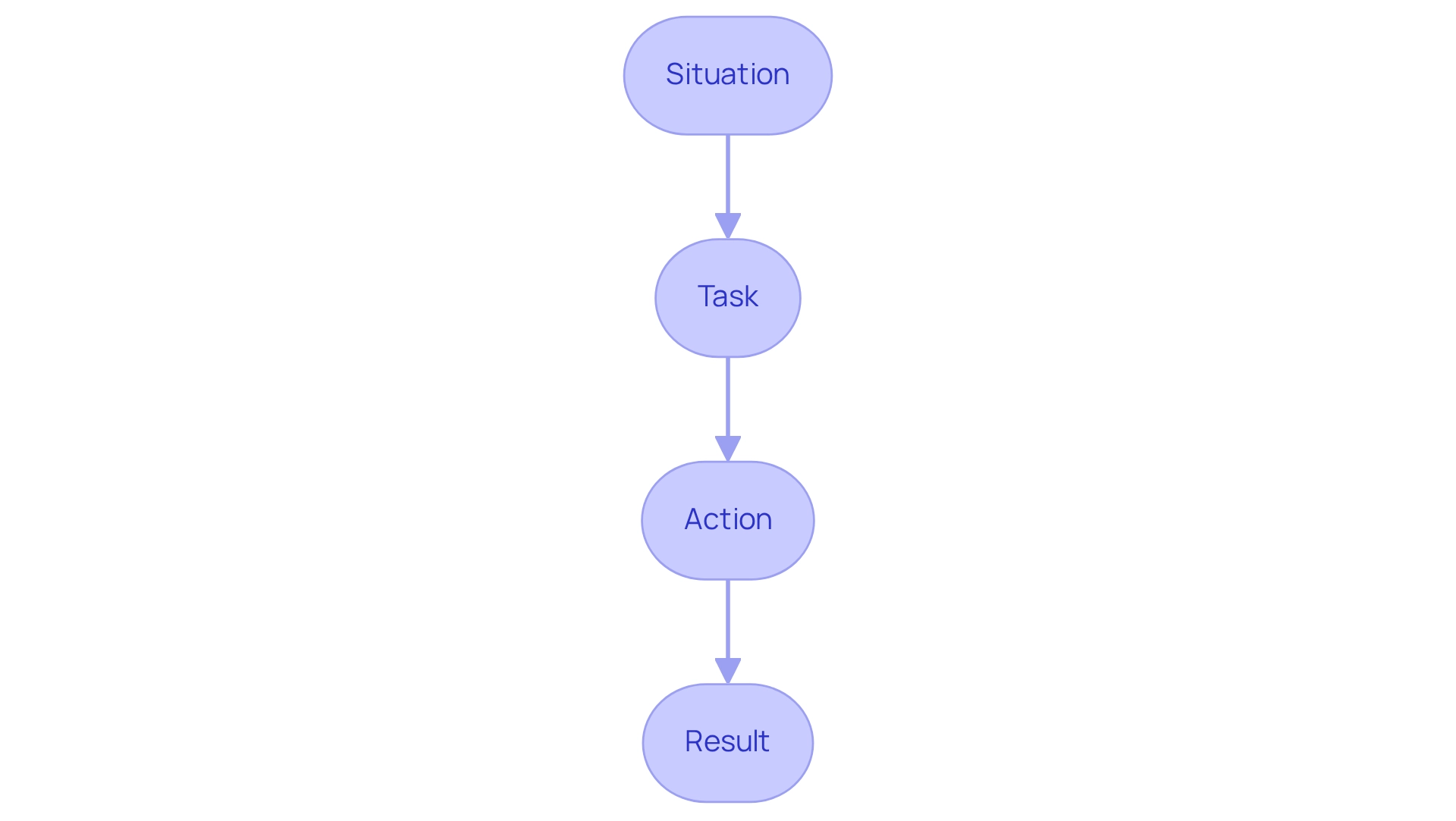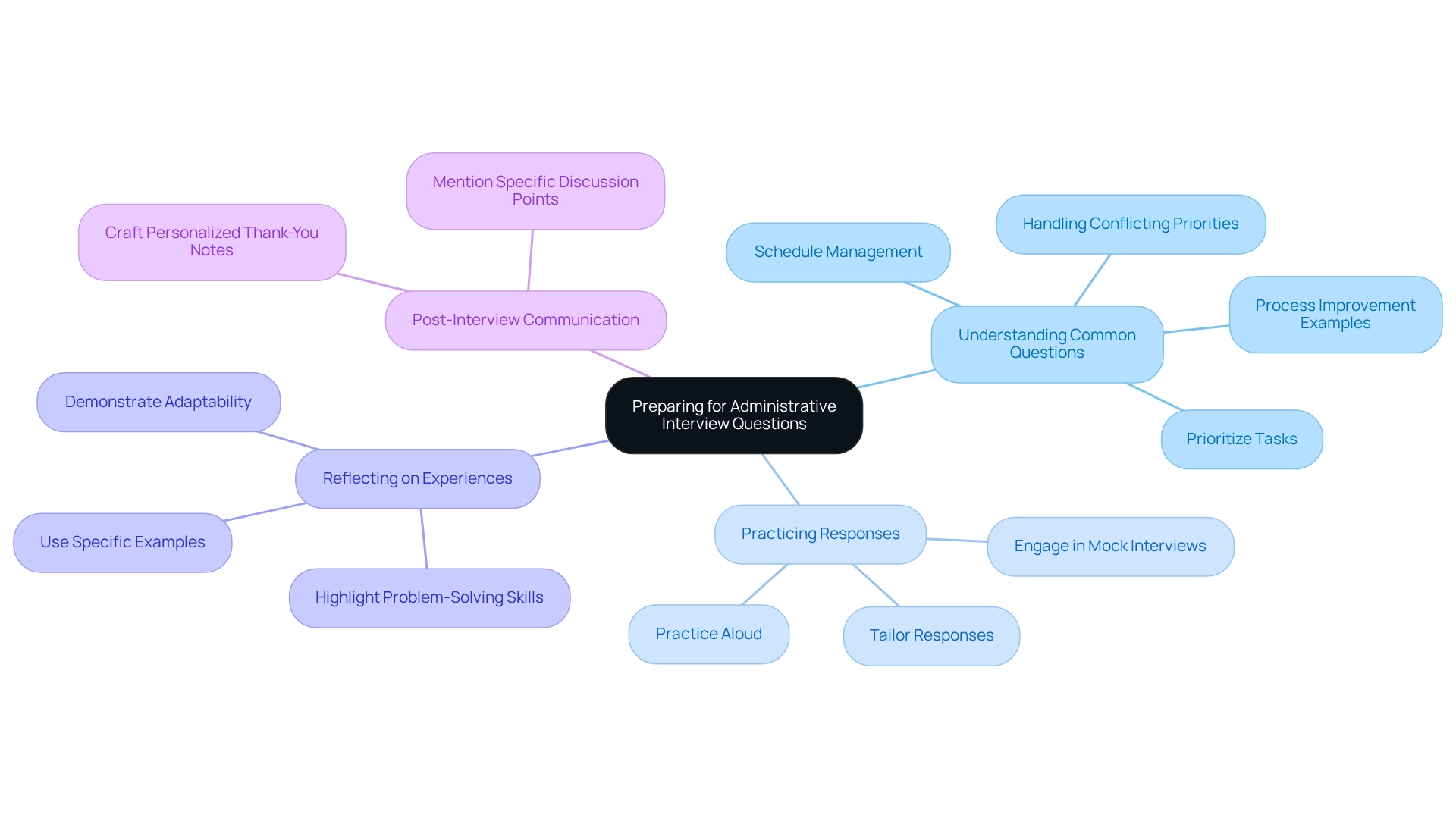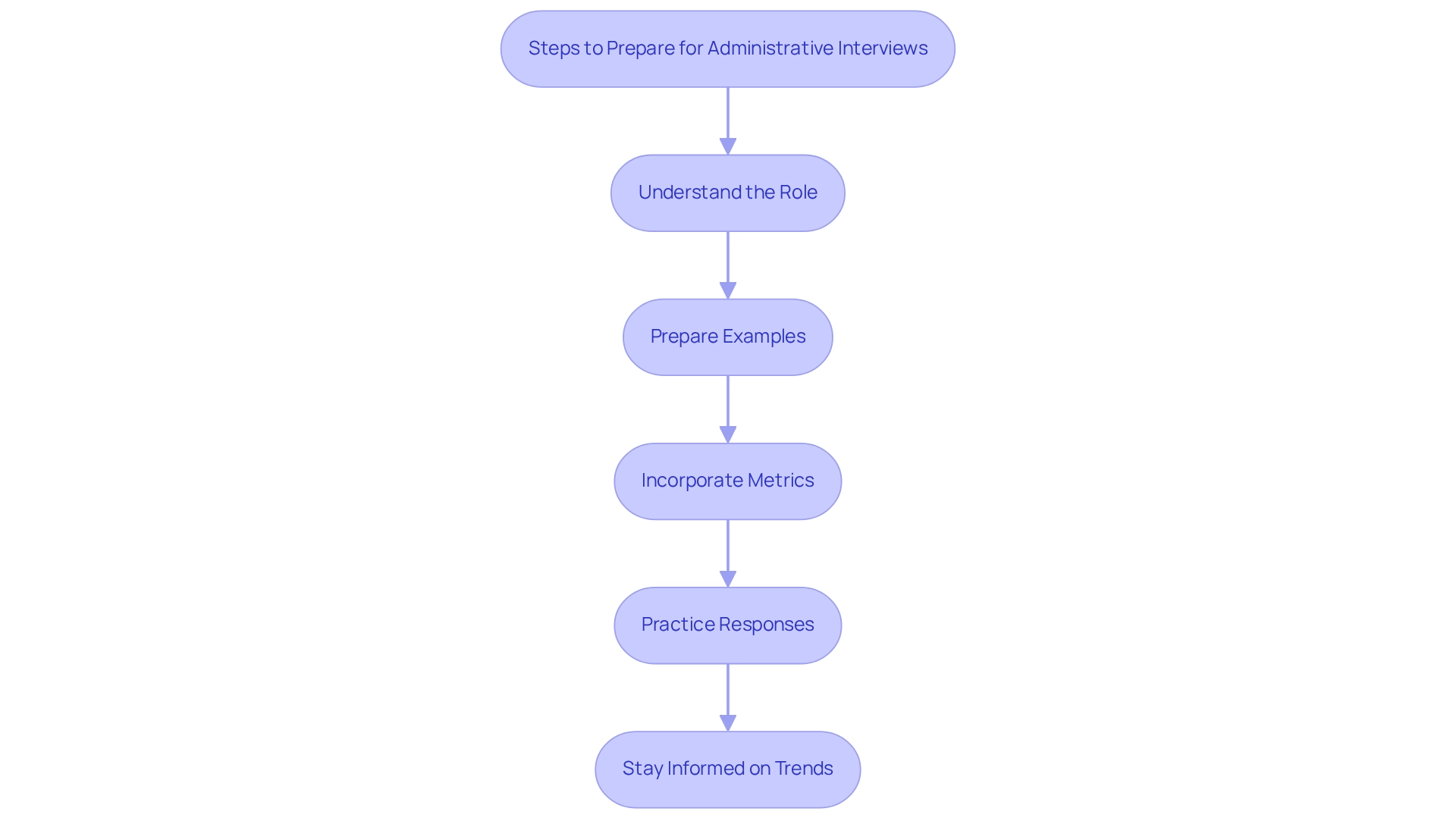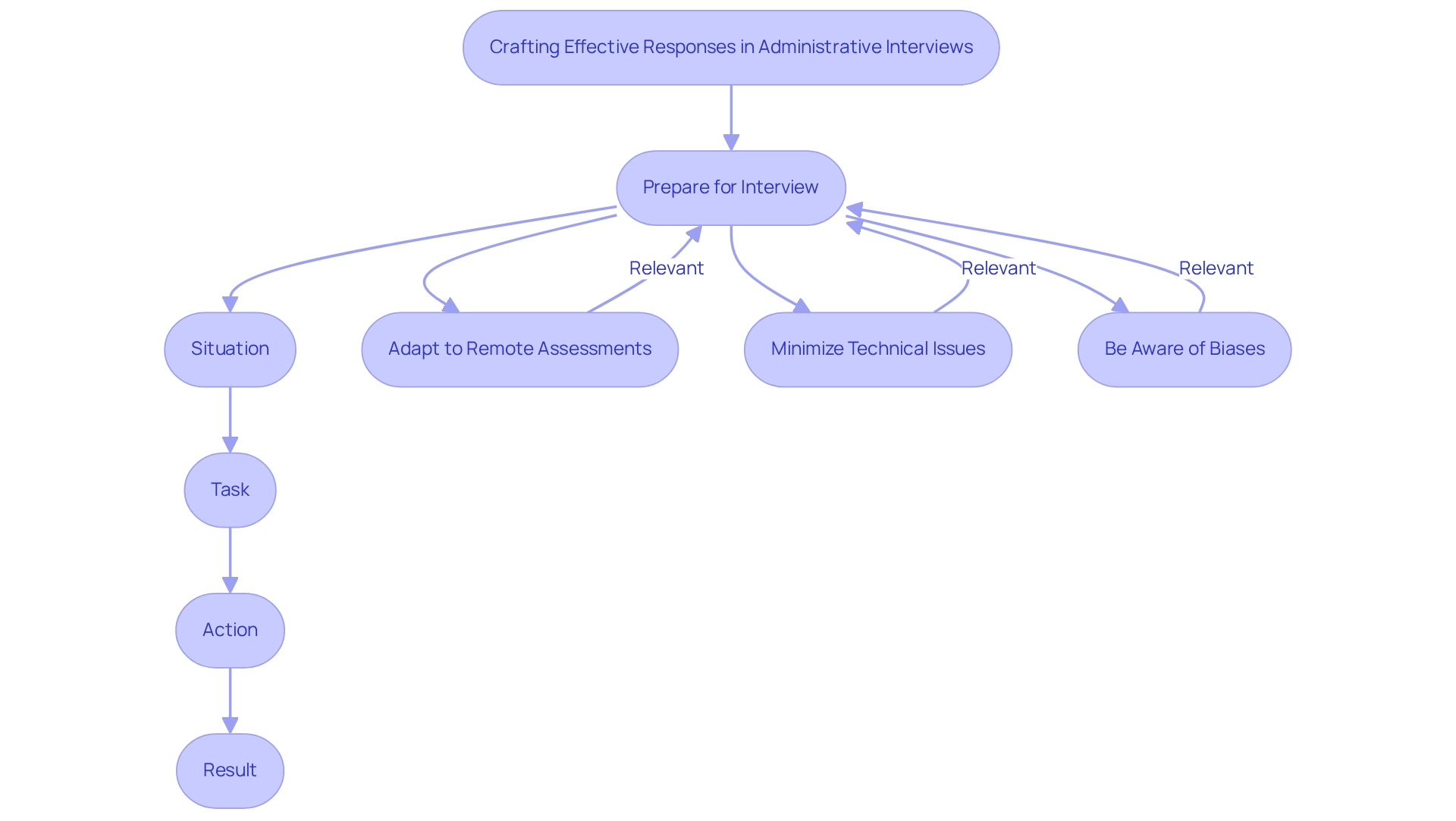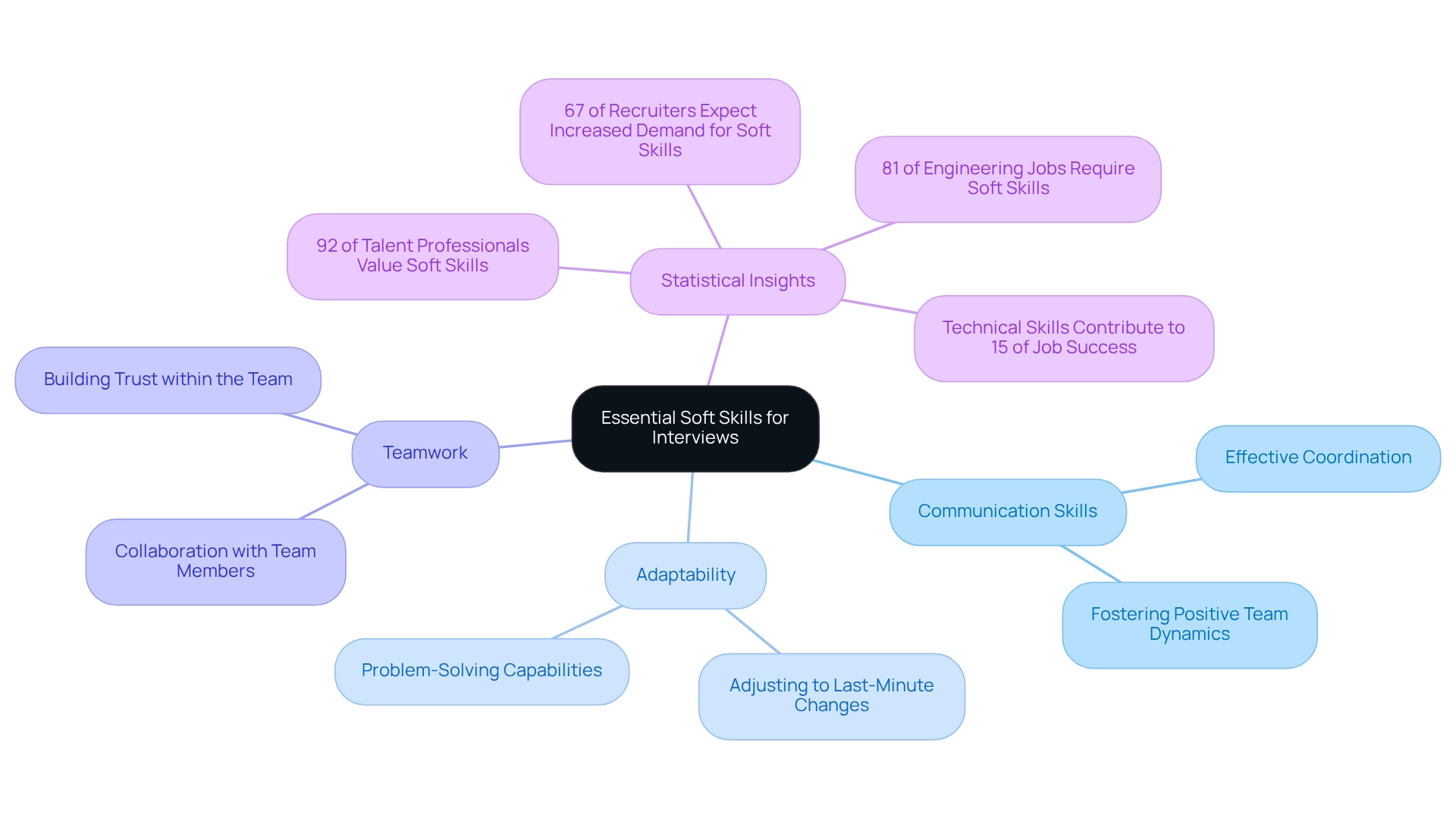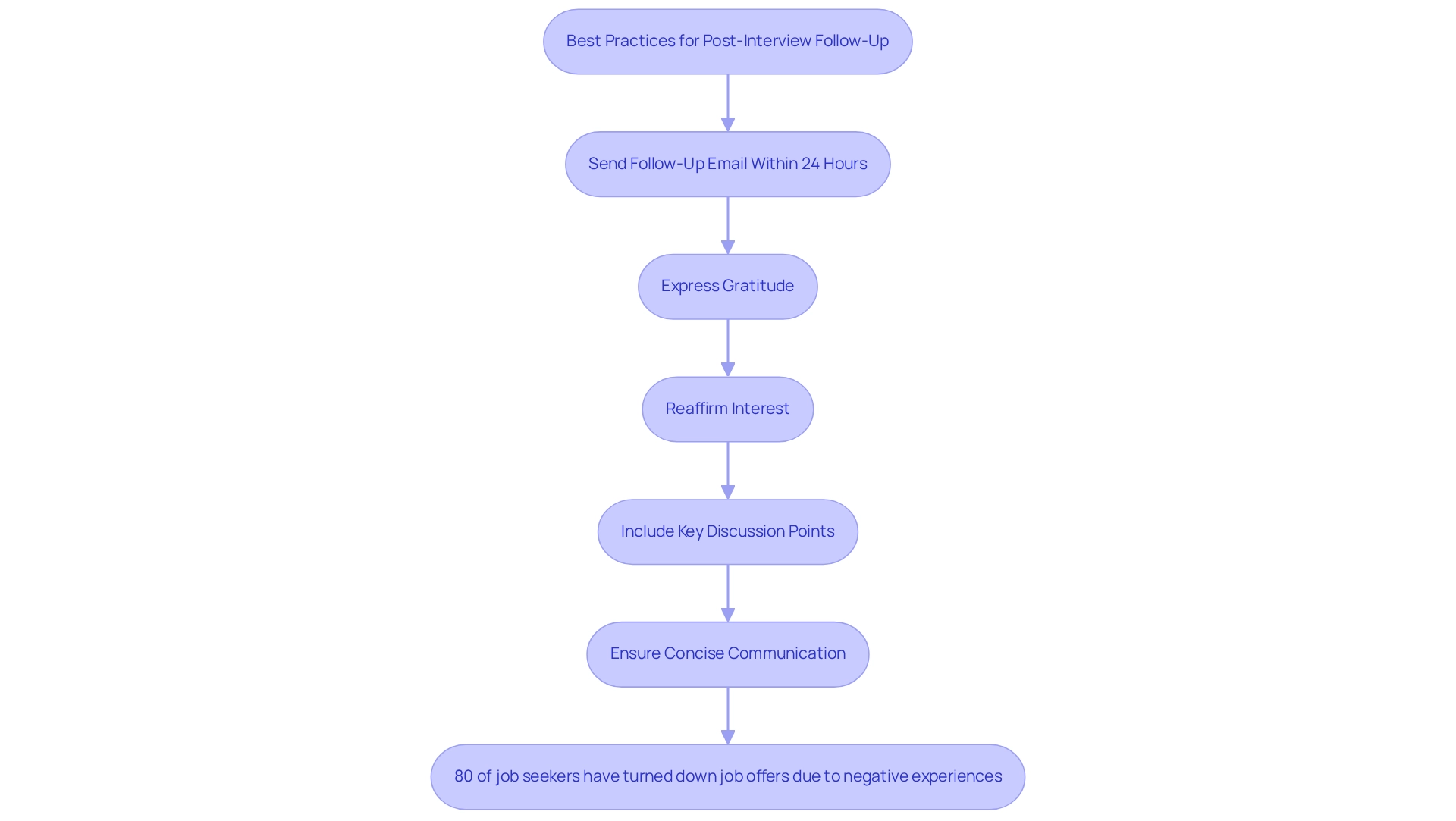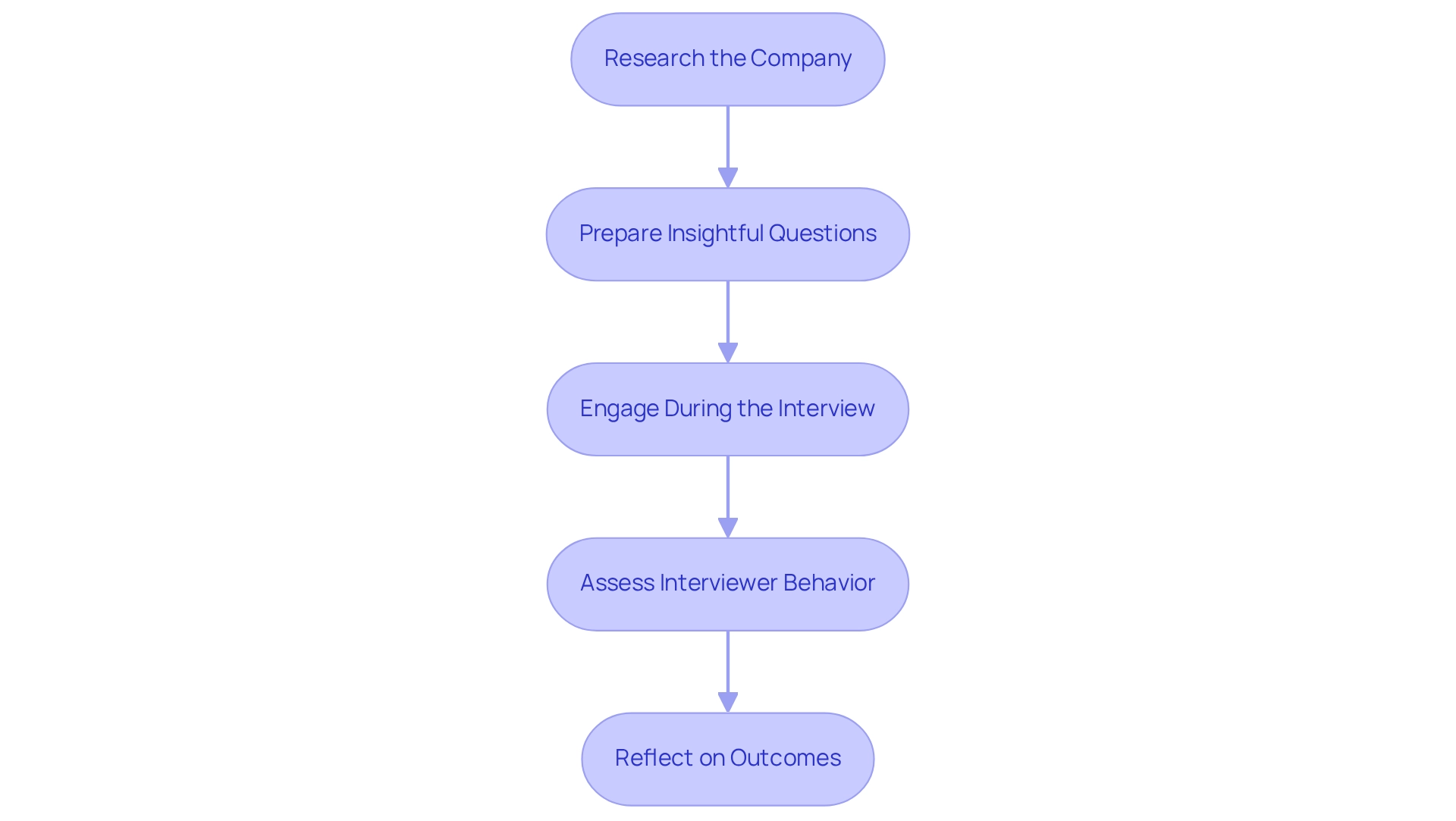Overview
The article presents proven strategies for effectively addressing administrative questions during interviews, underscoring the significance of the STAR method, thorough preparation for common inquiries, and the necessity of effective follow-up communication. These best practices are bolstered by statistics and expert insights, illustrating how structured responses and strong interpersonal skills can markedly improve candidates’ prospects of receiving job offers in a fiercely competitive job market.
Key Highlights:
- The STAR method (Situation, Task, Action, Result) helps structure responses to behavioral interview questions, showcasing candidates’ skills and experiences.
- Approximately 20% of applicants who excel in assessments secure job offers, emphasizing the need for effective interview techniques like the STAR method.
- Preparation for common administrative interview questions is essential, with candidates advised to practice responses to improve clarity and confidence.
- Candidates should emphasize soft skills, as 92% of talent professionals consider them crucial for organizational success.
- Post-interview follow-up emails should be sent within 24 hours, expressing gratitude and reaffirming interest, as timely communication can significantly impact hiring decisions.
- Asking insightful questions during interviews reflects genuine interest and critical thinking, positively influencing interviewers’ perceptions.
Introduction
In the competitive landscape of job interviews, candidates confront the formidable challenge of distinguishing themselves from a multitude of applicants. The STAR method—an acronym for Situation, Task, Action, and Result—stands out as an essential strategy for crafting impactful responses to behavioral interview questions. This technique not only enables candidates to convey their experiences with clarity but also offers interviewers critical insights into their problem-solving abilities and overall compatibility within an organization.
As candidates navigate the complexities of the interview process, mastering this method can substantially improve their prospects for success, particularly as they prepare to assess potential employers with equal rigor. From grasping common administrative inquiries to emphasizing vital soft skills, this article explores the strategies that empower candidates to present themselves with confidence and effectiveness in interviews.
Understanding the STAR Method for Behavioral Interviews
The STAR method—representing Situation, Task, Action, and Result—serves as a potent technique that enables individuals to effectively organize their responses to behavioral interview questions. This method not only promotes a clear narrative but also provides interviewers with a comprehensive understanding of an applicant’s skills and experiences, a necessity in today’s competitive talent landscape. At Boutique Recruiting, we recognize that astute and resourceful individuals are not merely on the lookout for any position; they are evaluating potential employers just as much as they are being evaluated.
Consider the scenario where an applicant is prompted to describe a challenging situation. They might initiate by outlining the specific context (Situation), followed by the objectives they aimed to achieve (Task). Subsequently, they would detail the steps they took to address the issue (Action), culminating with the outcomes of their efforts (Result). This organized approach not only underscores the individual’s problem-solving capabilities but also illustrates their ability to critically reflect on past experiences—an essential trait as applicants assess potential employers alongside their own evaluations.
Research indicates that approximately 20% of applicants who excel during assessments secure job offers, underscoring the importance of effective assessment methods. This statistic suggests that individuals utilizing the STAR method may have a greater opportunity to distinguish themselves, as employers increasingly favor this approach for its clarity in evaluating competencies and fit. Tracy Brower, a PhD Senior Contributor, emphasizes this point: “When you receive a meeting, you’ll do well to use the STAR technique,” reinforcing the method’s efficacy in uncovering a person’s true potential while allowing individuals to gauge how well the employer aligns with their career aspirations.
A case study examining the impact of live technical evaluations during assessments revealed that such tests could diminish participant performance by up to 50% due to heightened stress and cognitive load. This finding highlights the imperative for interviewers to cultivate a supportive environment that empowers applicants to showcase their skills without undue pressure. By employing the STAR method, individuals can navigate these high-pressure scenarios more adeptly, presenting their qualifications in an organized and confident manner, which may alleviate the stress associated with live evaluations and enhance their overall experience.
In conclusion, mastering the STAR method not only equips individuals with a valuable resource for discussions but also aligns with contemporary best practices in recruitment, establishing it as a preferred choice among employers intent on identifying top talent in a challenging job market.
Preparing for Common Administrative Interview Questions
To excel in administrative assessments, candidates must thoroughly familiarize themselves with common questions such as ‘How do you prioritize tasks?’ and ‘Can you describe your experience with scheduling?’ Reflecting on past experiences and aligning them with these inquiries is crucial for formulating compelling responses.
Practicing responses aloud not only enhances delivery but also guarantees clarity during the actual discussion.
Preparation significantly influences interview performance, particularly for administrative questions where organizational abilities and attention to detail are paramount. Career coaches advise individuals to cultivate a structured method for responding to these inquiries. This includes outlining key experiences that demonstrate relevant skills and preparing specific examples that highlight problem-solving abilities and adaptability.
Statistics reveal that individuals who practice their responses are more likely to articulate their thoughts clearly and confidently. For instance, a study discovered that applicants who participated in practice sessions indicated a 30% rise in their perceived preparedness compared to those who did not. Moreover, grasping the subtleties of typical administrative interview questions can provide applicants with a competitive advantage.
In 2025, some of the most frequently asked administrative interview questions include:
- ‘What tools do you use for task management?’
- ‘How do you handle conflicting priorities?’
- ‘Can you give an example of a time you improved a process?’
Case studies demonstrate that applicants who prepare tailored responses, reflecting on their discussions with interviewers, tend to leave a lasting impression. For example, individuals who avoid generic thank-you emails and instead craft personalized notes that mention specific discussion points are more likely to establish rapport and distinguish themselves in the hiring process. As noted by Mason Dayan, “Great article! This post-interview thank you email template is precisely what applicants require to make a lasting impression.”
Ultimately, successful interview preparation strategies for administrative roles involve a combination of understanding common questions, practicing responses, and reflecting on personal experiences that showcase relevant skills. By adopting these best practices, individuals can enhance their chances of success in securing their desired positions. Boutique Recruiting’s impressive track record of success further underscores the importance of thorough preparation and personalized communication in the recruitment process.
Key Administrative Interview Questions to Anticipate
Candidates must prepare for pivotal questions such as, ‘What role do you think an administrative assistant plays in a team?’ and ‘How do you handle tight deadlines?’ These inquiries in the administrative questions interview are designed to assess an applicant’s understanding of the administrative role and their ability to perform under pressure.
Grasping the subtleties of these inquiries is vital, as they not only evaluate technical skills but also measure interpersonal abilities and adaptability. To thrive in these interviews, applicants should prepare specific examples that demonstrate their organizational and communication skills. For instance, when discussing how to manage tight deadlines, an applicant might recount a situation where they successfully prioritized tasks to meet a critical deadline, illustrating their problem-solving capabilities and time management skills. Moreover, HR experts emphasize the importance of demonstrating a proactive approach to challenges.
Candidates can enhance their responses by incorporating metrics or outcomes from past experiences, such as how their efforts led to improved efficiency or team collaboration. This not only offers solid proof of their skills but aligns with the expectations of hiring managers seeking individuals who can contribute positively to the workplace. As Eric Eddy observed, the firm’s capability to provide exceptional applicants swiftly and effectively highlights the significance of these insights.
As the environment of administrative positions evolves, applicants should also be mindful of the anticipated administrative questions interview in 2025. Questions may include scenarios that test adaptability to new technologies or methods of communication, reflecting the ongoing changes in workplace dynamics. The Central Limit Theorem indicates that as individuals prepare for these assessments, their comprehension of sample queries will enhance, resulting in improved performance.
By staying informed and practicing responses to these key questions, applicants can position themselves as strong contenders in the competitive job market. Furthermore, just as managing imbalanced datasets necessitates strategic methods, applicants must be prepared to adjust their skills to tackle the various challenges encountered in assessments.
Crafting Effective Responses to Administrative Questions
In the competitive landscape of recruitment, particularly within the financial sector, formulating clear and relevant responses during administrative questions interviews is essential. The STAR method—Situation, Task, Action, Result—emerges as an effective framework for structuring these answers. For instance, when prompted to describe a scenario where you improved a process, candidates should delineate the specific situation encountered, detail the responsibilities undertaken, explain the actions implemented to resolve the issue, and underscore the positive outcomes achieved.
This organized approach not only yields comprehensive responses but also showcases the applicant’s problem-solving capabilities, a critical aspect since candidates evaluate your organization just as meticulously as you assess them.
Research indicates that structured assessments—conducted in-person, via phone, or through video conferencing—significantly enhance the effectiveness of applicant evaluations. As remote work continues to proliferate in 2025, it is imperative to adapt hiring strategies to include video assessments and evaluate remote work competencies. Candidates must be prepared to navigate potential technical challenges, such as audio issues, which frequently arise in virtual contexts.
A pertinent case study illustrates that ensuring both the applicant’s and recruiter’s technology operates smoothly prior to the interview can minimize disruptions and foster a more fluid conversation, ultimately enriching the applicant’s experience. Furthermore, employing the STAR method can yield more impactful responses. Career specialists advocate for applicants to practice their replies for administrative questions interviews, concentrating on relevant problem-solving examples that align with job specifications.
For example, a compelling STAR response might involve an applicant detailing how they optimized an administrative process, resulting in heightened efficiency and cost savings for their previous employer. Such narratives not only validate the candidate’s qualifications but also resonate with the hiring manager’s expectations, positively influencing hiring decisions. It is crucial to remain cognizant of potential biases in the selection process; researchers Wolgast, Björklund & Bäckström note that candidates of varying ethnicities may receive fewer job-relevant inquiries from evaluators, emphasizing the necessity for clarity and relevance in responses.
While organized discussions hold significant advantages, it is vital to acknowledge their limitations, including potential biases in rapport evaluations, to present a balanced view of their effectiveness. By ensuring a streamlined recruitment process—especially through the active engagement of hiring managers—financial firms can more effectively attract and retain top talent in this competitive environment. Specific roles, such as CFOs and Financial Managers, must particularly heed these dynamics, as the inability to secure top talent can have profound implications for organizational success.
Highlighting Essential Soft Skills in Your Answers
Candidates must proactively showcase their interpersonal abilities during an administrative questions interview, as these qualities are increasingly vital in administrative roles. For instance, when discussing a challenging project, individuals can emphasize their communication skills by detailing how they effectively coordinated with team members to achieve a common goal. This not only illustrates their capacity for collaboration but also underscores their role in nurturing a positive team dynamic.
Moreover, candidates should present specific examples where their adaptability was essential in navigating unexpected challenges. For example, they might recount a situation where they had to swiftly adjust their plans due to a last-minute change in project scope, highlighting their flexibility and problem-solving capabilities. Such narratives reinforce their suitability for the dynamic nature of administrative interviews, where the ability to pivot and respond to shifting priorities is crucial.
The significance of interpersonal abilities in administrative questions interviews cannot be overstated. Recent surveys reveal that 92% of talent professionals regard soft competencies as fundamental for organizational success, with a notable 67% of recruiters anticipating an increased demand for these attributes in the coming years. This trend is further accentuated by the evolving workforce, where automation and AI are reshaping job requirements, rendering interpersonal skills even more valuable.
As Dr. Mark Scullard, senior director of product innovation at Wiley, asserts, “Interpersonal abilities are crucial for fostering effective communication, collaboration, and adaptability in the workplace.”
Furthermore, it is essential to acknowledge that technical expertise and practical skills account for merely 15% of success in a job, particularly evident in administrative questions interviews, thus highlighting the relative importance of interpersonal abilities in these positions. To effectively emphasize these interpersonal attributes during interviews, applicants should prepare by reflecting on past experiences that showcase their capabilities. They can practice articulating these examples clearly and confidently, ensuring they convey the impact of their soft skills on their previous roles.
By doing so, individuals will not only align themselves with the expectations of HR professionals but will also position themselves as valuable assets in a competitive job market.
Post-Interview Follow-Up: Best Practices
Following a discussion, it is imperative for applicants to send a follow-up email within 24 hours. This email must not only express gratitude for the opportunity but also reaffirm the applicant’s interest in the position. Including a brief reference to a significant point raised during the discussion can personalize the message and enhance the applicant’s alignment with the role.
Concise and professional communication is vital, as it enables applicants to distinguish themselves and showcases their enthusiasm.
Statistics reveal that:
- 80% of job seekers have turned down job offers due to negative experiences during the evaluation process, emphasizing the importance of leaving a positive impression afterward.
- Timely communication, such as thank-you notes, plays a crucial role in hiring decisions; a majority of hiring managers indicate that receiving a thank-you note influences their decision-making process.
- A case study titled “The Impact of Timely Communication on Hiring Decisions” demonstrates that prompt follow-up communication can create a favorable impression on potential employers and significantly affect hiring outcomes.
In 2025, best practices for post-interview follow-ups underscore the importance of crafting thoughtful emails that reflect the individual’s personality while maintaining professional standards. Career specialists advocate for follow-up emails to be tailored to the specific meeting, showcasing attentiveness and engagement. Effective follow-up messages often include a summary of key discussion points and a reiteration of how the applicant’s skills align with the organization’s needs.
Moreover, it is essential to note that:
- 67% of employers believe that failing to establish eye contact is a common nonverbal mistake made by applicants, highlighting the need for strong communication skills during the selection process.
- Ultimately, effective follow-up emails can significantly sway hiring decisions, providing applicants with a final opportunity to reinforce their suitability for the role and leave a lasting impression on potential employers.
- In a competitive hiring landscape, where over half of employers require candidates to undergo four or more evaluations, timely follow-up communication becomes even more crucial.
Asking Insightful Questions to Impress Interviewers
Candidates should arrive prepared with thoughtful inquiries to present at the conclusion of the discussion, as this can significantly influence their overall impression. Questions such as ‘What are the biggest challenges facing the team right now?’ or ‘How do you measure success in this role?’ not only reflect a genuine interest in the position but also demonstrate a proactive approach to understanding the company’s needs. Engaging in this manner can leave a lasting positive impression and showcase the applicant’s critical thinking abilities.
Research indicates that nearly half of individuals (46%) have withdrawn from the recruitment process due to an interviewer’s negative attitude or behavior, underscoring the importance of an individual’s presentation during interviews. Moreover, 40% of interviewers agree that an applicant’s confidence plays a crucial role in hiring decisions. This implies that individuals who pose insightful inquiries are likely to be perceived as more assured and engaged, thereby improving their prospects for success.
Considering that merely 20% of individuals who interview ultimately secure the position, creating a strong impact is crucial. In 2025, applicants should emphasize inquiries that clarify their understanding of the role and reflect their alignment with the organization’s objectives and culture. For instance, questions about team dynamics or future projects can provide valuable insights while impressing interviewers. Furthermore, applicants should embrace transparency by being open about their work style preferences, salary expectations, and motivations for pursuing the role, as this authenticity can foster a deeper connection with the hiring manager.
It is essential for applicants to examine various job offers and avoid rushing into decisions, as the initial offer may not always be the most suitable. Ultimately, the types of inquiries individuals choose to make during the administrative questions interview can significantly influence the assessor’s viewpoint, making it essential to approach this aspect of the discussion with caution and purpose. Additionally, interviews serve to assess not only qualifications but also soft skills, behavior, and personality, which can be influenced by the types of questions candidates ask.
Conclusion
Mastering the intricacies of the interview process is essential for candidates aiming to distinguish themselves in a competitive job market. The STAR method offers a structured framework that empowers candidates to communicate their experiences effectively, showcasing their problem-solving abilities while also allowing them to evaluate potential employers. By preparing for common administrative questions and practicing responses, candidates can articulate their skills and experiences with clarity and confidence.
Highlighting essential soft skills during interviews is equally critical, as these attributes are increasingly recognized as vital for success in administrative roles. Demonstrating adaptability, communication, and teamwork can set candidates apart, aligning them with the expectations of hiring managers. Moreover, post-interview follow-ups and insightful questions can reinforce a candidate’s enthusiasm and suitability for the role, leaving a lasting impression on potential employers.
Ultimately, a combination of strategic preparation, effective communication, and self-awareness can significantly enhance a candidate’s chances of success. By embracing these best practices, individuals can navigate the interview landscape with confidence, ensuring they not only present themselves as ideal candidates but also assess potential employers with the same level of discernment. In an environment where every interaction counts, these strategies will empower candidates to secure the positions they desire while fostering mutual fit and alignment with their future employers.
Frequently Asked Questions
What is the STAR method and what does it stand for?
The STAR method is a technique used to organize responses to behavioral interview questions. It stands for Situation, Task, Action, and Result, providing a clear narrative that helps interviewers understand an applicant’s skills and experiences.
How does the STAR method benefit applicants during interviews?
The STAR method allows applicants to present their problem-solving capabilities and critically reflect on past experiences. It helps them articulate their qualifications in an organized manner, which can alleviate stress during interviews and enhance their overall experience.
Why is effective assessment important in the hiring process?
Research indicates that about 20% of applicants who excel during assessments secure job offers. Effective assessment methods, like the STAR technique, help candidates distinguish themselves and demonstrate their competencies in a competitive job market.
What is the impact of live technical evaluations on applicant performance?
A case study found that live technical evaluations could reduce participant performance by up to 50% due to increased stress and cognitive load. This emphasizes the need for interviewers to create a supportive environment for applicants.
What should candidates do to prepare for administrative assessments?
Candidates should familiarize themselves with common questions, reflect on past experiences, and practice responses aloud to enhance clarity and delivery. Preparation is key to performing well in administrative interviews.
What are some common administrative interview questions candidates should prepare for?
Common questions include: ‘How do you prioritize tasks?’, ‘Can you describe your experience with scheduling?’, ‘What tools do you use for task management?’, ‘How do you handle conflicting priorities?’, and ‘Can you give an example of a time you improved a process?’
How does practicing responses affect interview performance?
Statistics show that individuals who practice their responses are more likely to articulate their thoughts clearly and confidently. A study indicated that those who participated in practice sessions reported a 30% increase in perceived preparedness.
What strategies can candidates use to make a lasting impression after an interview?
Candidates should send personalized thank-you emails that reference specific discussion points from the interview, rather than generic messages. This approach helps establish rapport and distinguishes them in the hiring process.
